Analysis of Leadership Styles, CSR, and Social Media in Hospitality
VerifiedAdded on 2022/12/27
|18
|5167
|45
Report
AI Summary
This report examines the leadership styles employed within Hilton, a major player in the hospitality industry. It analyzes various leadership approaches, including transformational, democratic, autocratic, laissez-faire, bureaucratic, servant, transactional, situational, cross-cultural, and charismatic leadership, evaluating their application and effectiveness. The report further explores Hilton's organizational responsibility, defining its operational and social responsibilities and ethical considerations. It delves into how Hilton addresses social and ethical issues, emphasizing responsible leadership in the context of global challenges. The report also reviews Hilton's social media practices, providing insights into its strategies and impact. The conclusion summarizes the key findings and implications for the company and the broader hospitality sector, offering a comprehensive overview of emerging trends and management practices within Hilton.
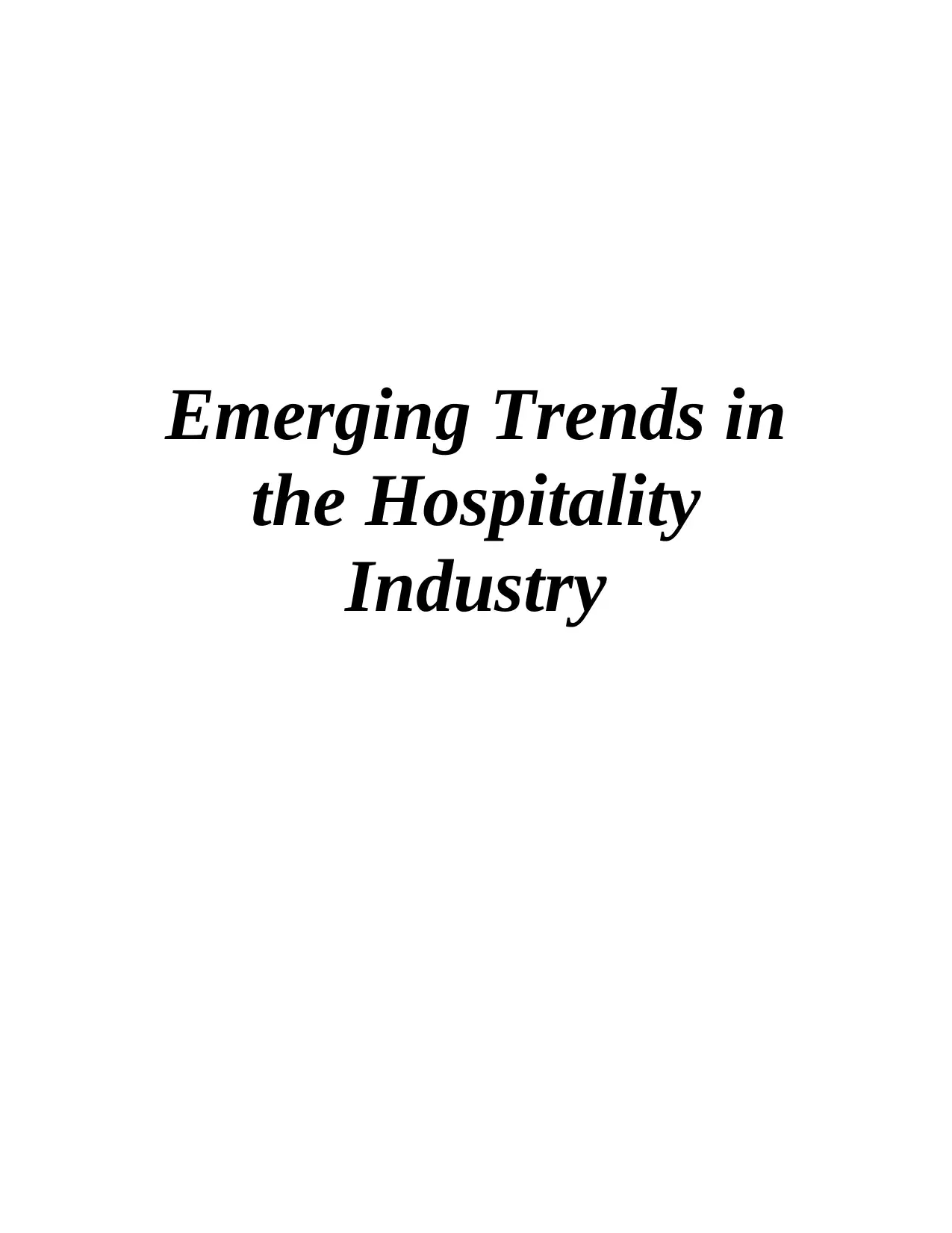
Emerging Trends in
the Hospitality
Industry
the Hospitality
Industry
Paraphrase This Document
Need a fresh take? Get an instant paraphrase of this document with our AI Paraphraser
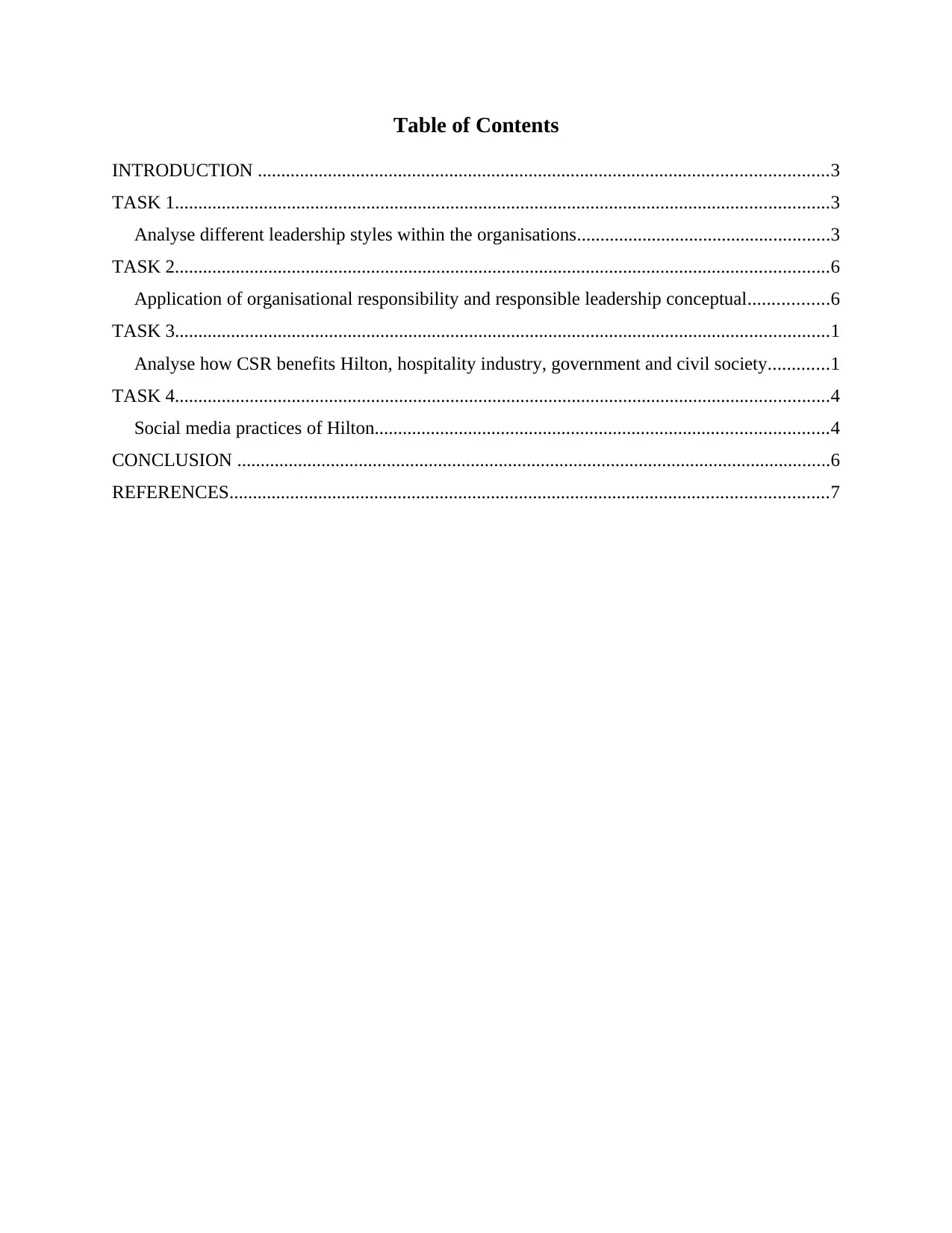
Table of Contents
INTRODUCTION ..........................................................................................................................3
TASK 1............................................................................................................................................3
Analyse different leadership styles within the organisations......................................................3
TASK 2............................................................................................................................................6
Application of organisational responsibility and responsible leadership conceptual.................6
TASK 3............................................................................................................................................1
Analyse how CSR benefits Hilton, hospitality industry, government and civil society.............1
TASK 4............................................................................................................................................4
Social media practices of Hilton.................................................................................................4
CONCLUSION ...............................................................................................................................6
REFERENCES................................................................................................................................7
INTRODUCTION ..........................................................................................................................3
TASK 1............................................................................................................................................3
Analyse different leadership styles within the organisations......................................................3
TASK 2............................................................................................................................................6
Application of organisational responsibility and responsible leadership conceptual.................6
TASK 3............................................................................................................................................1
Analyse how CSR benefits Hilton, hospitality industry, government and civil society.............1
TASK 4............................................................................................................................................4
Social media practices of Hilton.................................................................................................4
CONCLUSION ...............................................................................................................................6
REFERENCES................................................................................................................................7
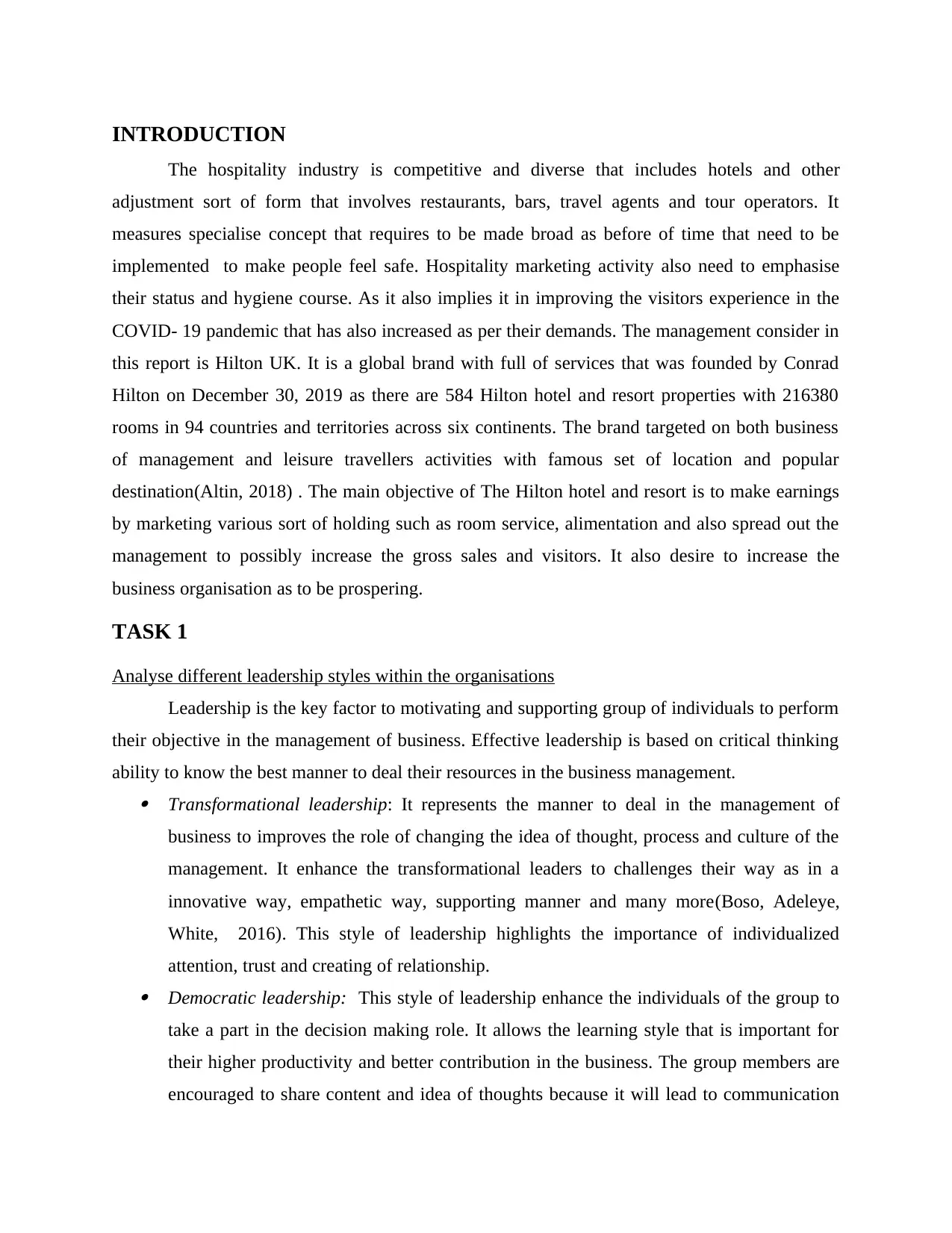
INTRODUCTION
The hospitality industry is competitive and diverse that includes hotels and other
adjustment sort of form that involves restaurants, bars, travel agents and tour operators. It
measures specialise concept that requires to be made broad as before of time that need to be
implemented to make people feel safe. Hospitality marketing activity also need to emphasise
their status and hygiene course. As it also implies it in improving the visitors experience in the
COVID- 19 pandemic that has also increased as per their demands. The management consider in
this report is Hilton UK. It is a global brand with full of services that was founded by Conrad
Hilton on December 30, 2019 as there are 584 Hilton hotel and resort properties with 216380
rooms in 94 countries and territories across six continents. The brand targeted on both business
of management and leisure travellers activities with famous set of location and popular
destination(Altin, 2018) . The main objective of The Hilton hotel and resort is to make earnings
by marketing various sort of holding such as room service, alimentation and also spread out the
management to possibly increase the gross sales and visitors. It also desire to increase the
business organisation as to be prospering.
TASK 1
Analyse different leadership styles within the organisations
Leadership is the key factor to motivating and supporting group of individuals to perform
their objective in the management of business. Effective leadership is based on critical thinking
ability to know the best manner to deal their resources in the business management. Transformational leadership: It represents the manner to deal in the management of
business to improves the role of changing the idea of thought, process and culture of the
management. It enhance the transformational leaders to challenges their way as in a
innovative way, empathetic way, supporting manner and many more(Boso, Adeleye,
White, 2016). This style of leadership highlights the importance of individualized
attention, trust and creating of relationship. Democratic leadership: This style of leadership enhance the individuals of the group to
take a part in the decision making role. It allows the learning style that is important for
their higher productivity and better contribution in the business. The group members are
encouraged to share content and idea of thoughts because it will lead to communication
The hospitality industry is competitive and diverse that includes hotels and other
adjustment sort of form that involves restaurants, bars, travel agents and tour operators. It
measures specialise concept that requires to be made broad as before of time that need to be
implemented to make people feel safe. Hospitality marketing activity also need to emphasise
their status and hygiene course. As it also implies it in improving the visitors experience in the
COVID- 19 pandemic that has also increased as per their demands. The management consider in
this report is Hilton UK. It is a global brand with full of services that was founded by Conrad
Hilton on December 30, 2019 as there are 584 Hilton hotel and resort properties with 216380
rooms in 94 countries and territories across six continents. The brand targeted on both business
of management and leisure travellers activities with famous set of location and popular
destination(Altin, 2018) . The main objective of The Hilton hotel and resort is to make earnings
by marketing various sort of holding such as room service, alimentation and also spread out the
management to possibly increase the gross sales and visitors. It also desire to increase the
business organisation as to be prospering.
TASK 1
Analyse different leadership styles within the organisations
Leadership is the key factor to motivating and supporting group of individuals to perform
their objective in the management of business. Effective leadership is based on critical thinking
ability to know the best manner to deal their resources in the business management. Transformational leadership: It represents the manner to deal in the management of
business to improves the role of changing the idea of thought, process and culture of the
management. It enhance the transformational leaders to challenges their way as in a
innovative way, empathetic way, supporting manner and many more(Boso, Adeleye,
White, 2016). This style of leadership highlights the importance of individualized
attention, trust and creating of relationship. Democratic leadership: This style of leadership enhance the individuals of the group to
take a part in the decision making role. It allows the learning style that is important for
their higher productivity and better contribution in the business. The group members are
encouraged to share content and idea of thoughts because it will lead to communication
⊘ This is a preview!⊘
Do you want full access?
Subscribe today to unlock all pages.

Trusted by 1+ million students worldwide
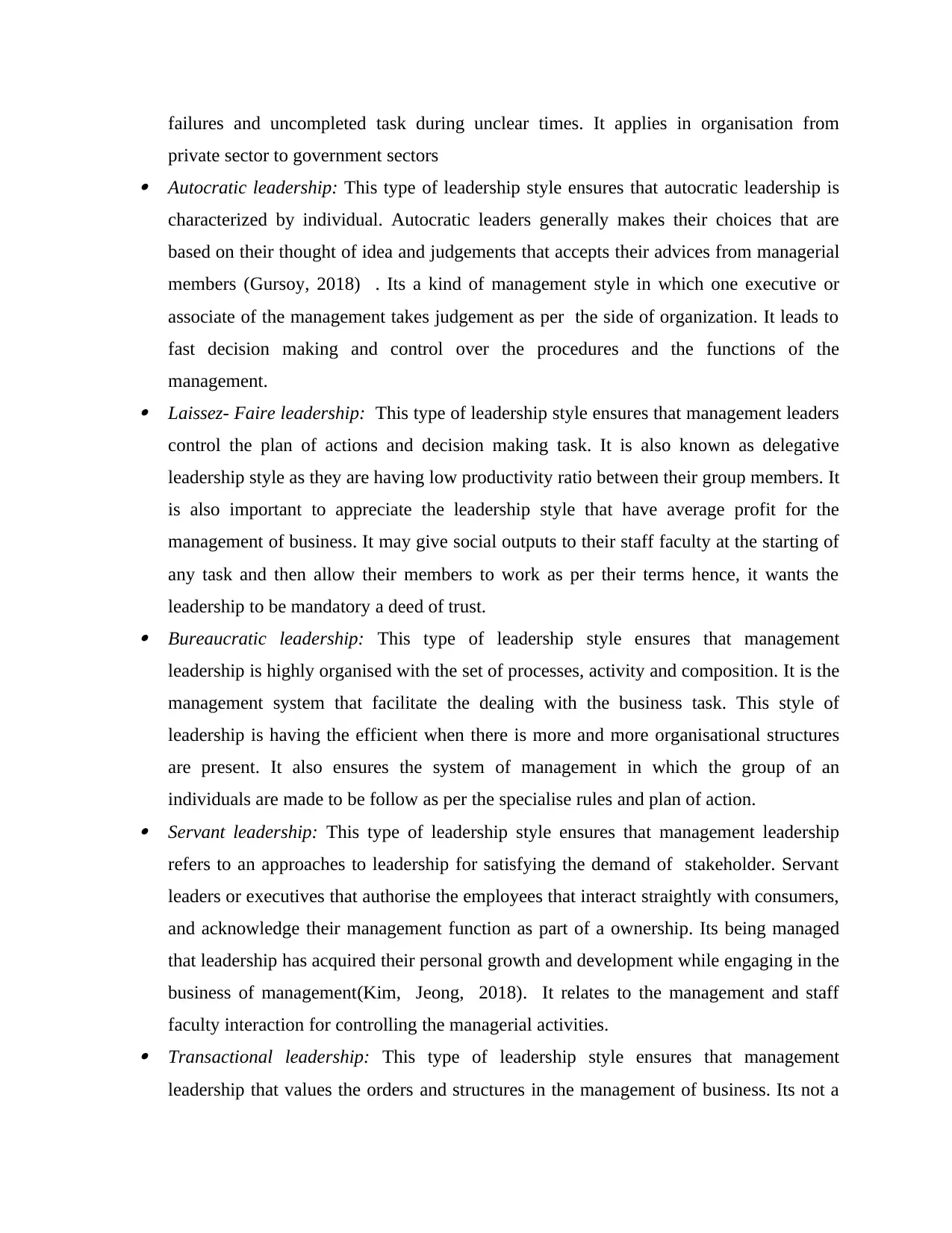
failures and uncompleted task during unclear times. It applies in organisation from
private sector to government sectors Autocratic leadership: This type of leadership style ensures that autocratic leadership is
characterized by individual. Autocratic leaders generally makes their choices that are
based on their thought of idea and judgements that accepts their advices from managerial
members (Gursoy, 2018) . Its a kind of management style in which one executive or
associate of the management takes judgement as per the side of organization. It leads to
fast decision making and control over the procedures and the functions of the
management. Laissez- Faire leadership: This type of leadership style ensures that management leaders
control the plan of actions and decision making task. It is also known as delegative
leadership style as they are having low productivity ratio between their group members. It
is also important to appreciate the leadership style that have average profit for the
management of business. It may give social outputs to their staff faculty at the starting of
any task and then allow their members to work as per their terms hence, it wants the
leadership to be mandatory a deed of trust. Bureaucratic leadership: This type of leadership style ensures that management
leadership is highly organised with the set of processes, activity and composition. It is the
management system that facilitate the dealing with the business task. This style of
leadership is having the efficient when there is more and more organisational structures
are present. It also ensures the system of management in which the group of an
individuals are made to be follow as per the specialise rules and plan of action. Servant leadership: This type of leadership style ensures that management leadership
refers to an approaches to leadership for satisfying the demand of stakeholder. Servant
leaders or executives that authorise the employees that interact straightly with consumers,
and acknowledge their management function as part of a ownership. Its being managed
that leadership has acquired their personal growth and development while engaging in the
business of management(Kim, Jeong, 2018). It relates to the management and staff
faculty interaction for controlling the managerial activities. Transactional leadership: This type of leadership style ensures that management
leadership that values the orders and structures in the management of business. Its not a
private sector to government sectors Autocratic leadership: This type of leadership style ensures that autocratic leadership is
characterized by individual. Autocratic leaders generally makes their choices that are
based on their thought of idea and judgements that accepts their advices from managerial
members (Gursoy, 2018) . Its a kind of management style in which one executive or
associate of the management takes judgement as per the side of organization. It leads to
fast decision making and control over the procedures and the functions of the
management. Laissez- Faire leadership: This type of leadership style ensures that management leaders
control the plan of actions and decision making task. It is also known as delegative
leadership style as they are having low productivity ratio between their group members. It
is also important to appreciate the leadership style that have average profit for the
management of business. It may give social outputs to their staff faculty at the starting of
any task and then allow their members to work as per their terms hence, it wants the
leadership to be mandatory a deed of trust. Bureaucratic leadership: This type of leadership style ensures that management
leadership is highly organised with the set of processes, activity and composition. It is the
management system that facilitate the dealing with the business task. This style of
leadership is having the efficient when there is more and more organisational structures
are present. It also ensures the system of management in which the group of an
individuals are made to be follow as per the specialise rules and plan of action. Servant leadership: This type of leadership style ensures that management leadership
refers to an approaches to leadership for satisfying the demand of stakeholder. Servant
leaders or executives that authorise the employees that interact straightly with consumers,
and acknowledge their management function as part of a ownership. Its being managed
that leadership has acquired their personal growth and development while engaging in the
business of management(Kim, Jeong, 2018). It relates to the management and staff
faculty interaction for controlling the managerial activities. Transactional leadership: This type of leadership style ensures that management
leadership that values the orders and structures in the management of business. Its not a
Paraphrase This Document
Need a fresh take? Get an instant paraphrase of this document with our AI Paraphraser
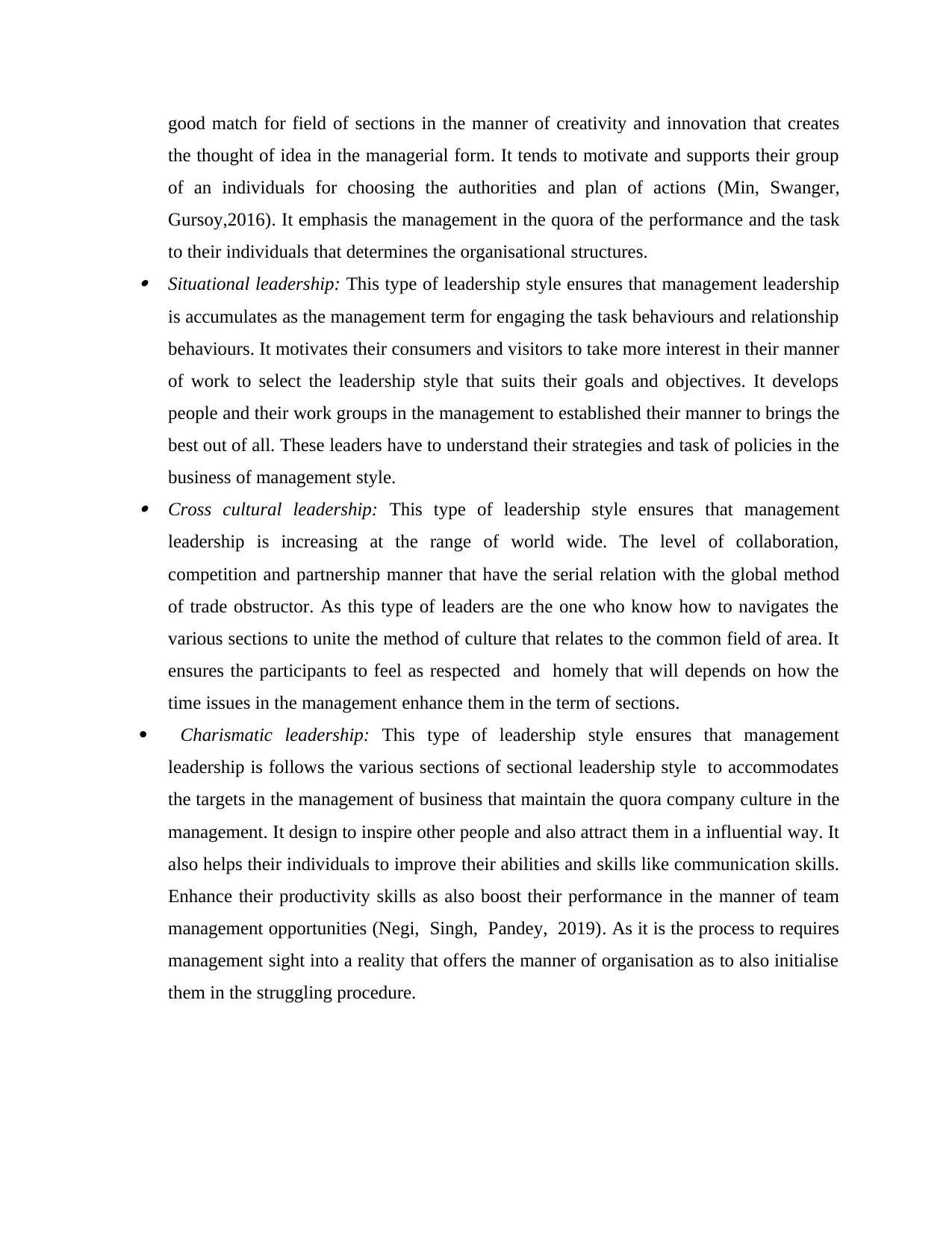
good match for field of sections in the manner of creativity and innovation that creates
the thought of idea in the managerial form. It tends to motivate and supports their group
of an individuals for choosing the authorities and plan of actions (Min, Swanger,
Gursoy,2016). It emphasis the management in the quora of the performance and the task
to their individuals that determines the organisational structures. Situational leadership: This type of leadership style ensures that management leadership
is accumulates as the management term for engaging the task behaviours and relationship
behaviours. It motivates their consumers and visitors to take more interest in their manner
of work to select the leadership style that suits their goals and objectives. It develops
people and their work groups in the management to established their manner to brings the
best out of all. These leaders have to understand their strategies and task of policies in the
business of management style. Cross cultural leadership: This type of leadership style ensures that management
leadership is increasing at the range of world wide. The level of collaboration,
competition and partnership manner that have the serial relation with the global method
of trade obstructor. As this type of leaders are the one who know how to navigates the
various sections to unite the method of culture that relates to the common field of area. It
ensures the participants to feel as respected and homely that will depends on how the
time issues in the management enhance them in the term of sections.
Charismatic leadership: This type of leadership style ensures that management
leadership is follows the various sections of sectional leadership style to accommodates
the targets in the management of business that maintain the quora company culture in the
management. It design to inspire other people and also attract them in a influential way. It
also helps their individuals to improve their abilities and skills like communication skills.
Enhance their productivity skills as also boost their performance in the manner of team
management opportunities (Negi, Singh, Pandey, 2019). As it is the process to requires
management sight into a reality that offers the manner of organisation as to also initialise
them in the struggling procedure.
the thought of idea in the managerial form. It tends to motivate and supports their group
of an individuals for choosing the authorities and plan of actions (Min, Swanger,
Gursoy,2016). It emphasis the management in the quora of the performance and the task
to their individuals that determines the organisational structures. Situational leadership: This type of leadership style ensures that management leadership
is accumulates as the management term for engaging the task behaviours and relationship
behaviours. It motivates their consumers and visitors to take more interest in their manner
of work to select the leadership style that suits their goals and objectives. It develops
people and their work groups in the management to established their manner to brings the
best out of all. These leaders have to understand their strategies and task of policies in the
business of management style. Cross cultural leadership: This type of leadership style ensures that management
leadership is increasing at the range of world wide. The level of collaboration,
competition and partnership manner that have the serial relation with the global method
of trade obstructor. As this type of leaders are the one who know how to navigates the
various sections to unite the method of culture that relates to the common field of area. It
ensures the participants to feel as respected and homely that will depends on how the
time issues in the management enhance them in the term of sections.
Charismatic leadership: This type of leadership style ensures that management
leadership is follows the various sections of sectional leadership style to accommodates
the targets in the management of business that maintain the quora company culture in the
management. It design to inspire other people and also attract them in a influential way. It
also helps their individuals to improve their abilities and skills like communication skills.
Enhance their productivity skills as also boost their performance in the manner of team
management opportunities (Negi, Singh, Pandey, 2019). As it is the process to requires
management sight into a reality that offers the manner of organisation as to also initialise
them in the struggling procedure.
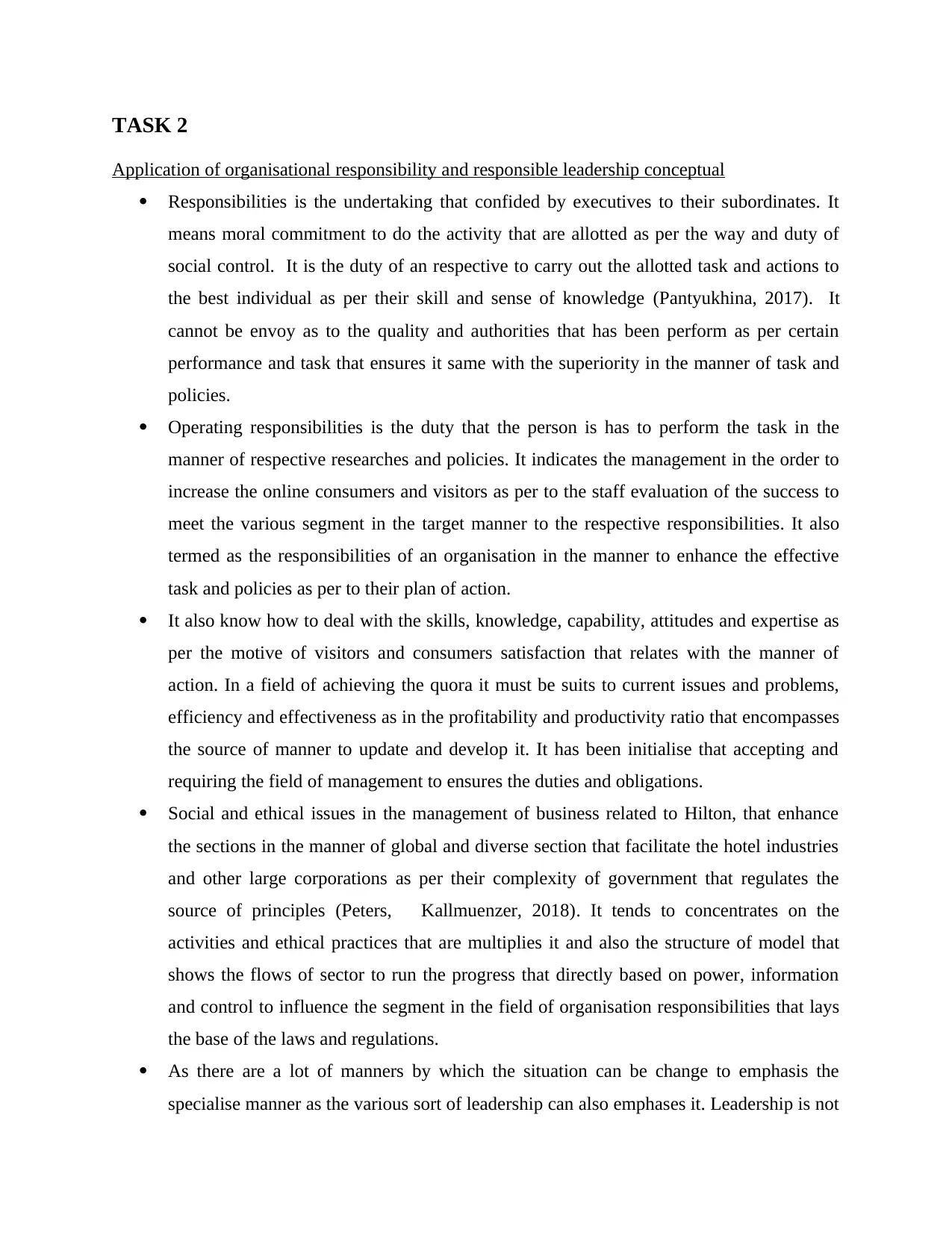
TASK 2
Application of organisational responsibility and responsible leadership conceptual
Responsibilities is the undertaking that confided by executives to their subordinates. It
means moral commitment to do the activity that are allotted as per the way and duty of
social control. It is the duty of an respective to carry out the allotted task and actions to
the best individual as per their skill and sense of knowledge (Pantyukhina, 2017). It
cannot be envoy as to the quality and authorities that has been perform as per certain
performance and task that ensures it same with the superiority in the manner of task and
policies.
Operating responsibilities is the duty that the person is has to perform the task in the
manner of respective researches and policies. It indicates the management in the order to
increase the online consumers and visitors as per to the staff evaluation of the success to
meet the various segment in the target manner to the respective responsibilities. It also
termed as the responsibilities of an organisation in the manner to enhance the effective
task and policies as per to their plan of action.
It also know how to deal with the skills, knowledge, capability, attitudes and expertise as
per the motive of visitors and consumers satisfaction that relates with the manner of
action. In a field of achieving the quora it must be suits to current issues and problems,
efficiency and effectiveness as in the profitability and productivity ratio that encompasses
the source of manner to update and develop it. It has been initialise that accepting and
requiring the field of management to ensures the duties and obligations.
Social and ethical issues in the management of business related to Hilton, that enhance
the sections in the manner of global and diverse section that facilitate the hotel industries
and other large corporations as per their complexity of government that regulates the
source of principles (Peters, Kallmuenzer, 2018). It tends to concentrates on the
activities and ethical practices that are multiplies it and also the structure of model that
shows the flows of sector to run the progress that directly based on power, information
and control to influence the segment in the field of organisation responsibilities that lays
the base of the laws and regulations.
As there are a lot of manners by which the situation can be change to emphasis the
specialise manner as the various sort of leadership can also emphases it. Leadership is not
Application of organisational responsibility and responsible leadership conceptual
Responsibilities is the undertaking that confided by executives to their subordinates. It
means moral commitment to do the activity that are allotted as per the way and duty of
social control. It is the duty of an respective to carry out the allotted task and actions to
the best individual as per their skill and sense of knowledge (Pantyukhina, 2017). It
cannot be envoy as to the quality and authorities that has been perform as per certain
performance and task that ensures it same with the superiority in the manner of task and
policies.
Operating responsibilities is the duty that the person is has to perform the task in the
manner of respective researches and policies. It indicates the management in the order to
increase the online consumers and visitors as per to the staff evaluation of the success to
meet the various segment in the target manner to the respective responsibilities. It also
termed as the responsibilities of an organisation in the manner to enhance the effective
task and policies as per to their plan of action.
It also know how to deal with the skills, knowledge, capability, attitudes and expertise as
per the motive of visitors and consumers satisfaction that relates with the manner of
action. In a field of achieving the quora it must be suits to current issues and problems,
efficiency and effectiveness as in the profitability and productivity ratio that encompasses
the source of manner to update and develop it. It has been initialise that accepting and
requiring the field of management to ensures the duties and obligations.
Social and ethical issues in the management of business related to Hilton, that enhance
the sections in the manner of global and diverse section that facilitate the hotel industries
and other large corporations as per their complexity of government that regulates the
source of principles (Peters, Kallmuenzer, 2018). It tends to concentrates on the
activities and ethical practices that are multiplies it and also the structure of model that
shows the flows of sector to run the progress that directly based on power, information
and control to influence the segment in the field of organisation responsibilities that lays
the base of the laws and regulations.
As there are a lot of manners by which the situation can be change to emphasis the
specialise manner as the various sort of leadership can also emphases it. Leadership is not
⊘ This is a preview!⊘
Do you want full access?
Subscribe today to unlock all pages.

Trusted by 1+ million students worldwide
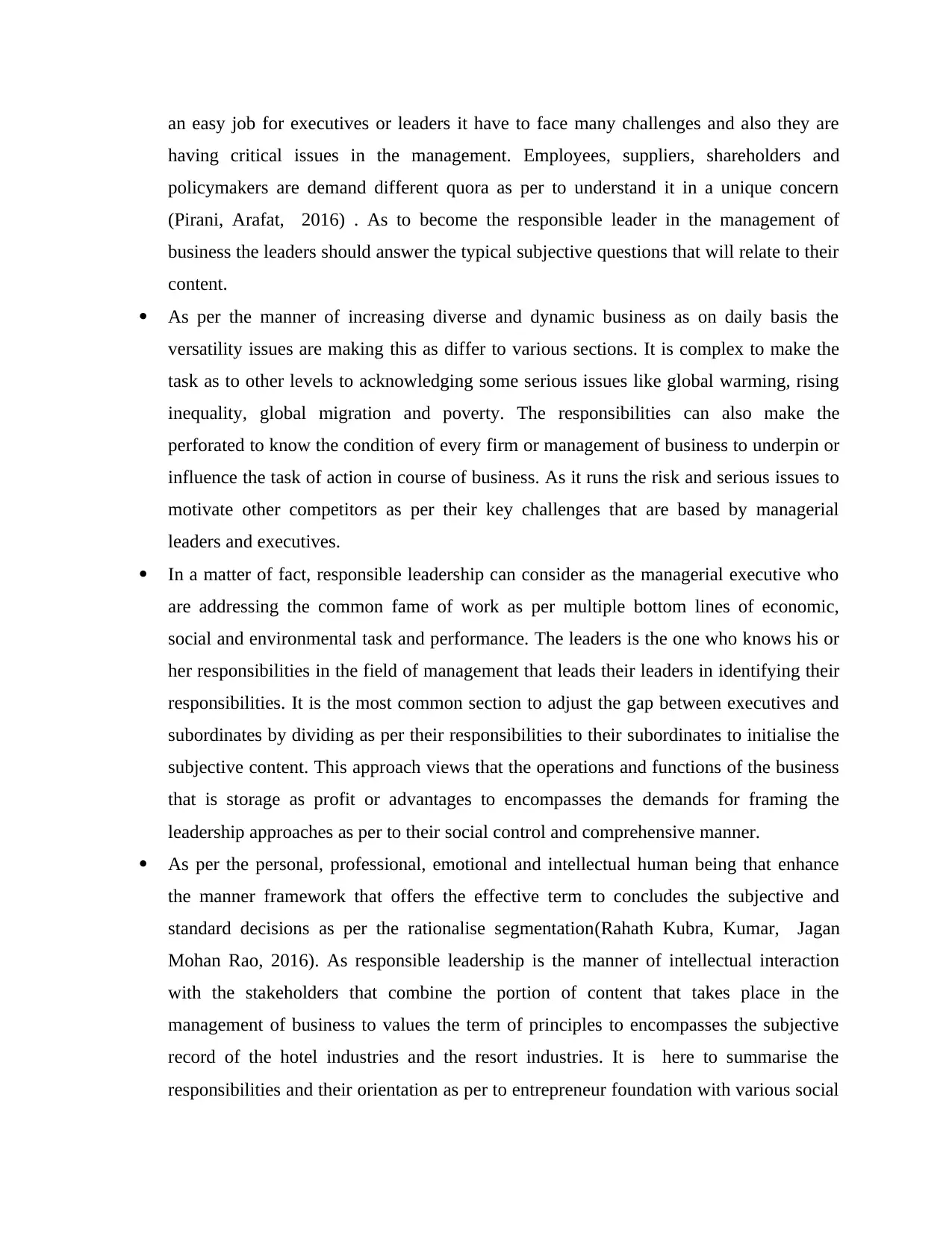
an easy job for executives or leaders it have to face many challenges and also they are
having critical issues in the management. Employees, suppliers, shareholders and
policymakers are demand different quora as per to understand it in a unique concern
(Pirani, Arafat, 2016) . As to become the responsible leader in the management of
business the leaders should answer the typical subjective questions that will relate to their
content.
As per the manner of increasing diverse and dynamic business as on daily basis the
versatility issues are making this as differ to various sections. It is complex to make the
task as to other levels to acknowledging some serious issues like global warming, rising
inequality, global migration and poverty. The responsibilities can also make the
perforated to know the condition of every firm or management of business to underpin or
influence the task of action in course of business. As it runs the risk and serious issues to
motivate other competitors as per their key challenges that are based by managerial
leaders and executives.
In a matter of fact, responsible leadership can consider as the managerial executive who
are addressing the common fame of work as per multiple bottom lines of economic,
social and environmental task and performance. The leaders is the one who knows his or
her responsibilities in the field of management that leads their leaders in identifying their
responsibilities. It is the most common section to adjust the gap between executives and
subordinates by dividing as per their responsibilities to their subordinates to initialise the
subjective content. This approach views that the operations and functions of the business
that is storage as profit or advantages to encompasses the demands for framing the
leadership approaches as per to their social control and comprehensive manner.
As per the personal, professional, emotional and intellectual human being that enhance
the manner framework that offers the effective term to concludes the subjective and
standard decisions as per the rationalise segmentation(Rahath Kubra, Kumar, Jagan
Mohan Rao, 2016). As responsible leadership is the manner of intellectual interaction
with the stakeholders that combine the portion of content that takes place in the
management of business to values the term of principles to encompasses the subjective
record of the hotel industries and the resort industries. It is here to summarise the
responsibilities and their orientation as per to entrepreneur foundation with various social
having critical issues in the management. Employees, suppliers, shareholders and
policymakers are demand different quora as per to understand it in a unique concern
(Pirani, Arafat, 2016) . As to become the responsible leader in the management of
business the leaders should answer the typical subjective questions that will relate to their
content.
As per the manner of increasing diverse and dynamic business as on daily basis the
versatility issues are making this as differ to various sections. It is complex to make the
task as to other levels to acknowledging some serious issues like global warming, rising
inequality, global migration and poverty. The responsibilities can also make the
perforated to know the condition of every firm or management of business to underpin or
influence the task of action in course of business. As it runs the risk and serious issues to
motivate other competitors as per their key challenges that are based by managerial
leaders and executives.
In a matter of fact, responsible leadership can consider as the managerial executive who
are addressing the common fame of work as per multiple bottom lines of economic,
social and environmental task and performance. The leaders is the one who knows his or
her responsibilities in the field of management that leads their leaders in identifying their
responsibilities. It is the most common section to adjust the gap between executives and
subordinates by dividing as per their responsibilities to their subordinates to initialise the
subjective content. This approach views that the operations and functions of the business
that is storage as profit or advantages to encompasses the demands for framing the
leadership approaches as per to their social control and comprehensive manner.
As per the personal, professional, emotional and intellectual human being that enhance
the manner framework that offers the effective term to concludes the subjective and
standard decisions as per the rationalise segmentation(Rahath Kubra, Kumar, Jagan
Mohan Rao, 2016). As responsible leadership is the manner of intellectual interaction
with the stakeholders that combine the portion of content that takes place in the
management of business to values the term of principles to encompasses the subjective
record of the hotel industries and the resort industries. It is here to summarise the
responsibilities and their orientation as per to entrepreneur foundation with various social
Paraphrase This Document
Need a fresh take? Get an instant paraphrase of this document with our AI Paraphraser
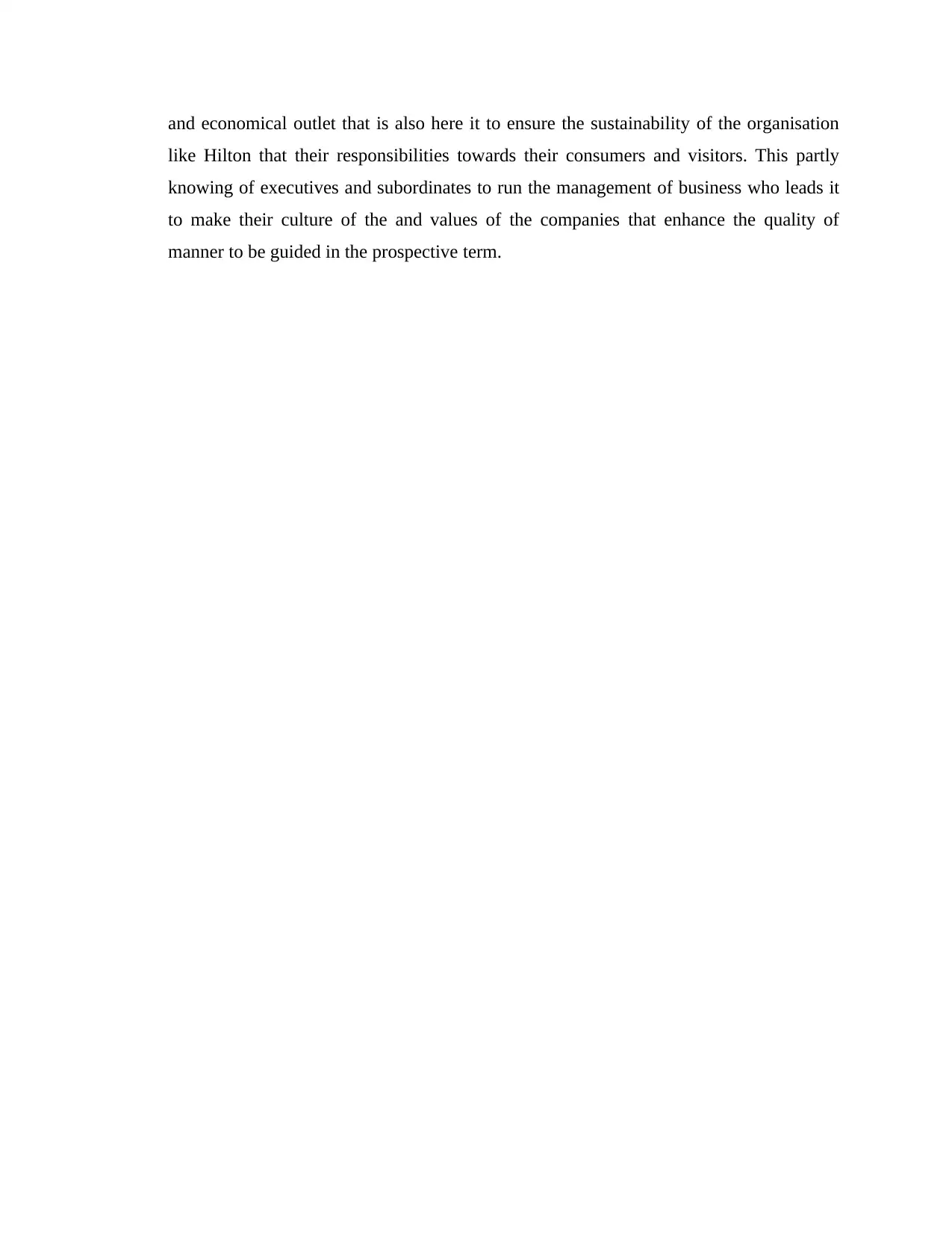
and economical outlet that is also here it to ensure the sustainability of the organisation
like Hilton that their responsibilities towards their consumers and visitors. This partly
knowing of executives and subordinates to run the management of business who leads it
to make their culture of the and values of the companies that enhance the quality of
manner to be guided in the prospective term.
like Hilton that their responsibilities towards their consumers and visitors. This partly
knowing of executives and subordinates to run the management of business who leads it
to make their culture of the and values of the companies that enhance the quality of
manner to be guided in the prospective term.
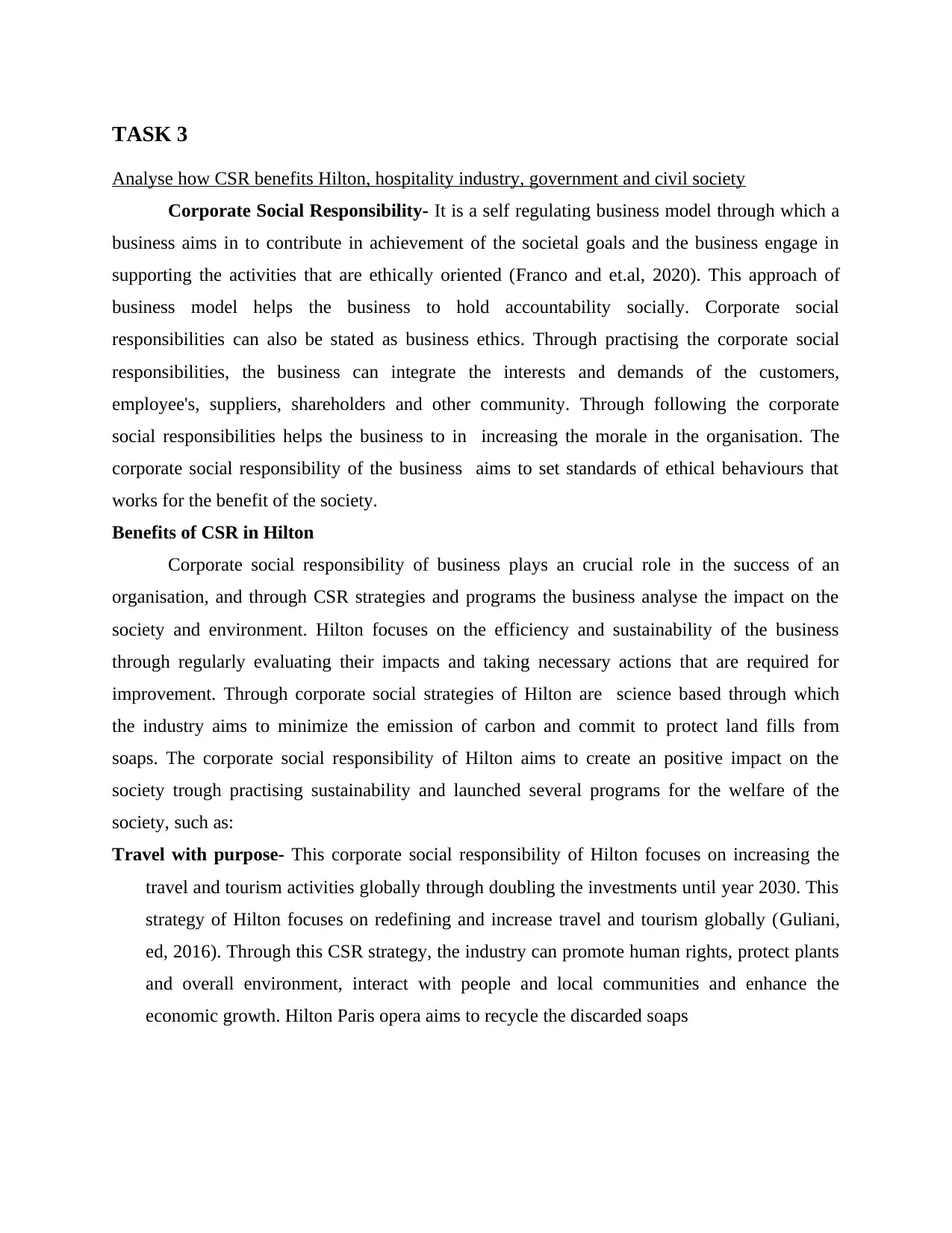
TASK 3
Analyse how CSR benefits Hilton, hospitality industry, government and civil society
Corporate Social Responsibility- It is a self regulating business model through which a
business aims in to contribute in achievement of the societal goals and the business engage in
supporting the activities that are ethically oriented (Franco and et.al, 2020). This approach of
business model helps the business to hold accountability socially. Corporate social
responsibilities can also be stated as business ethics. Through practising the corporate social
responsibilities, the business can integrate the interests and demands of the customers,
employee's, suppliers, shareholders and other community. Through following the corporate
social responsibilities helps the business to in increasing the morale in the organisation. The
corporate social responsibility of the business aims to set standards of ethical behaviours that
works for the benefit of the society.
Benefits of CSR in Hilton
Corporate social responsibility of business plays an crucial role in the success of an
organisation, and through CSR strategies and programs the business analyse the impact on the
society and environment. Hilton focuses on the efficiency and sustainability of the business
through regularly evaluating their impacts and taking necessary actions that are required for
improvement. Through corporate social strategies of Hilton are science based through which
the industry aims to minimize the emission of carbon and commit to protect land fills from
soaps. The corporate social responsibility of Hilton aims to create an positive impact on the
society trough practising sustainability and launched several programs for the welfare of the
society, such as:
Travel with purpose- This corporate social responsibility of Hilton focuses on increasing the
travel and tourism activities globally through doubling the investments until year 2030. This
strategy of Hilton focuses on redefining and increase travel and tourism globally (Guliani,
ed, 2016). Through this CSR strategy, the industry can promote human rights, protect plants
and overall environment, interact with people and local communities and enhance the
economic growth. Hilton Paris opera aims to recycle the discarded soaps
Analyse how CSR benefits Hilton, hospitality industry, government and civil society
Corporate Social Responsibility- It is a self regulating business model through which a
business aims in to contribute in achievement of the societal goals and the business engage in
supporting the activities that are ethically oriented (Franco and et.al, 2020). This approach of
business model helps the business to hold accountability socially. Corporate social
responsibilities can also be stated as business ethics. Through practising the corporate social
responsibilities, the business can integrate the interests and demands of the customers,
employee's, suppliers, shareholders and other community. Through following the corporate
social responsibilities helps the business to in increasing the morale in the organisation. The
corporate social responsibility of the business aims to set standards of ethical behaviours that
works for the benefit of the society.
Benefits of CSR in Hilton
Corporate social responsibility of business plays an crucial role in the success of an
organisation, and through CSR strategies and programs the business analyse the impact on the
society and environment. Hilton focuses on the efficiency and sustainability of the business
through regularly evaluating their impacts and taking necessary actions that are required for
improvement. Through corporate social strategies of Hilton are science based through which
the industry aims to minimize the emission of carbon and commit to protect land fills from
soaps. The corporate social responsibility of Hilton aims to create an positive impact on the
society trough practising sustainability and launched several programs for the welfare of the
society, such as:
Travel with purpose- This corporate social responsibility of Hilton focuses on increasing the
travel and tourism activities globally through doubling the investments until year 2030. This
strategy of Hilton focuses on redefining and increase travel and tourism globally (Guliani,
ed, 2016). Through this CSR strategy, the industry can promote human rights, protect plants
and overall environment, interact with people and local communities and enhance the
economic growth. Hilton Paris opera aims to recycle the discarded soaps
⊘ This is a preview!⊘
Do you want full access?
Subscribe today to unlock all pages.

Trusted by 1+ million students worldwide
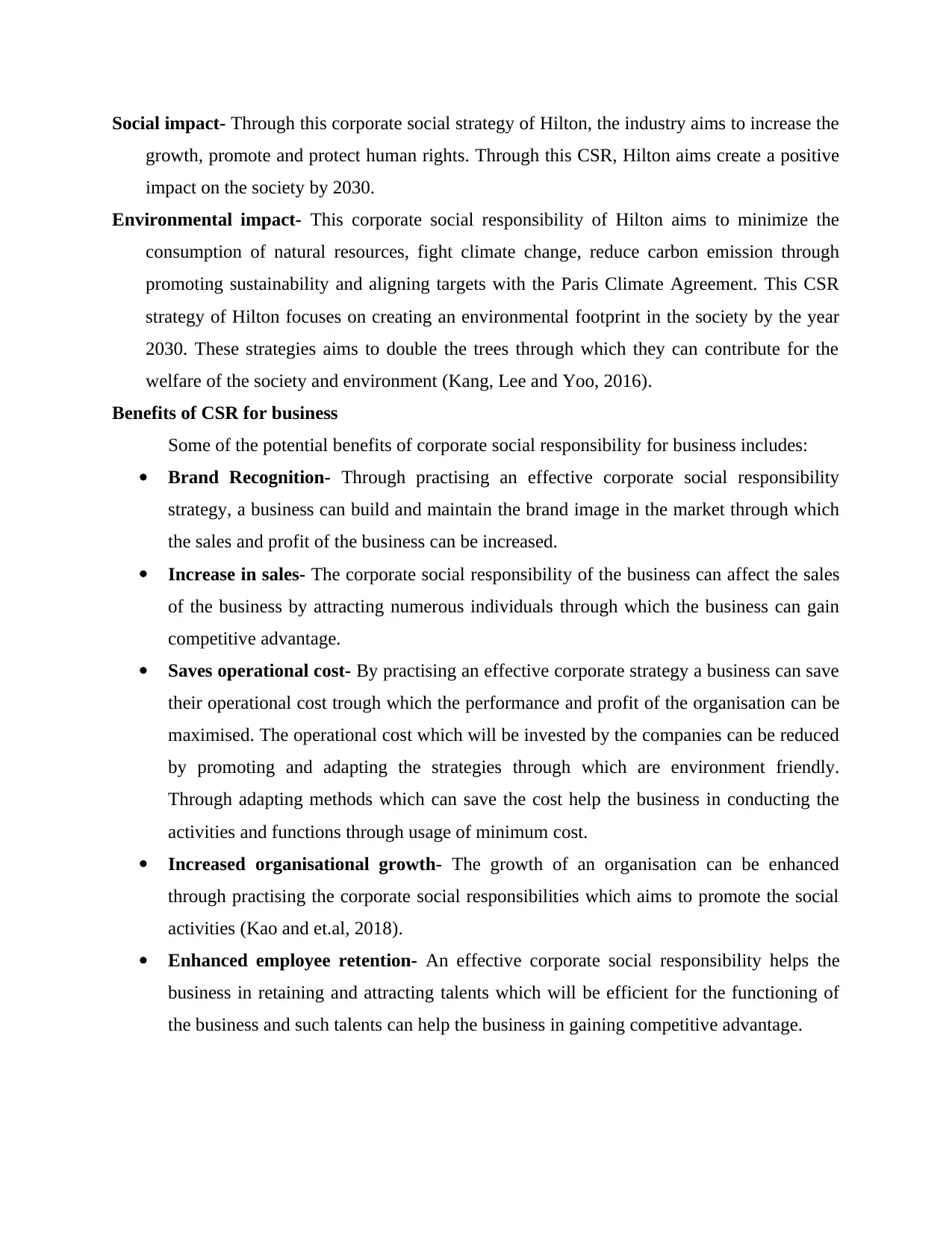
Social impact- Through this corporate social strategy of Hilton, the industry aims to increase the
growth, promote and protect human rights. Through this CSR, Hilton aims create a positive
impact on the society by 2030.
Environmental impact- This corporate social responsibility of Hilton aims to minimize the
consumption of natural resources, fight climate change, reduce carbon emission through
promoting sustainability and aligning targets with the Paris Climate Agreement. This CSR
strategy of Hilton focuses on creating an environmental footprint in the society by the year
2030. These strategies aims to double the trees through which they can contribute for the
welfare of the society and environment (Kang, Lee and Yoo, 2016).
Benefits of CSR for business
Some of the potential benefits of corporate social responsibility for business includes:
Brand Recognition- Through practising an effective corporate social responsibility
strategy, a business can build and maintain the brand image in the market through which
the sales and profit of the business can be increased.
Increase in sales- The corporate social responsibility of the business can affect the sales
of the business by attracting numerous individuals through which the business can gain
competitive advantage.
Saves operational cost- By practising an effective corporate strategy a business can save
their operational cost trough which the performance and profit of the organisation can be
maximised. The operational cost which will be invested by the companies can be reduced
by promoting and adapting the strategies through which are environment friendly.
Through adapting methods which can save the cost help the business in conducting the
activities and functions through usage of minimum cost.
Increased organisational growth- The growth of an organisation can be enhanced
through practising the corporate social responsibilities which aims to promote the social
activities (Kao and et.al, 2018).
Enhanced employee retention- An effective corporate social responsibility helps the
business in retaining and attracting talents which will be efficient for the functioning of
the business and such talents can help the business in gaining competitive advantage.
growth, promote and protect human rights. Through this CSR, Hilton aims create a positive
impact on the society by 2030.
Environmental impact- This corporate social responsibility of Hilton aims to minimize the
consumption of natural resources, fight climate change, reduce carbon emission through
promoting sustainability and aligning targets with the Paris Climate Agreement. This CSR
strategy of Hilton focuses on creating an environmental footprint in the society by the year
2030. These strategies aims to double the trees through which they can contribute for the
welfare of the society and environment (Kang, Lee and Yoo, 2016).
Benefits of CSR for business
Some of the potential benefits of corporate social responsibility for business includes:
Brand Recognition- Through practising an effective corporate social responsibility
strategy, a business can build and maintain the brand image in the market through which
the sales and profit of the business can be increased.
Increase in sales- The corporate social responsibility of the business can affect the sales
of the business by attracting numerous individuals through which the business can gain
competitive advantage.
Saves operational cost- By practising an effective corporate strategy a business can save
their operational cost trough which the performance and profit of the organisation can be
maximised. The operational cost which will be invested by the companies can be reduced
by promoting and adapting the strategies through which are environment friendly.
Through adapting methods which can save the cost help the business in conducting the
activities and functions through usage of minimum cost.
Increased organisational growth- The growth of an organisation can be enhanced
through practising the corporate social responsibilities which aims to promote the social
activities (Kao and et.al, 2018).
Enhanced employee retention- An effective corporate social responsibility helps the
business in retaining and attracting talents which will be efficient for the functioning of
the business and such talents can help the business in gaining competitive advantage.
Paraphrase This Document
Need a fresh take? Get an instant paraphrase of this document with our AI Paraphraser
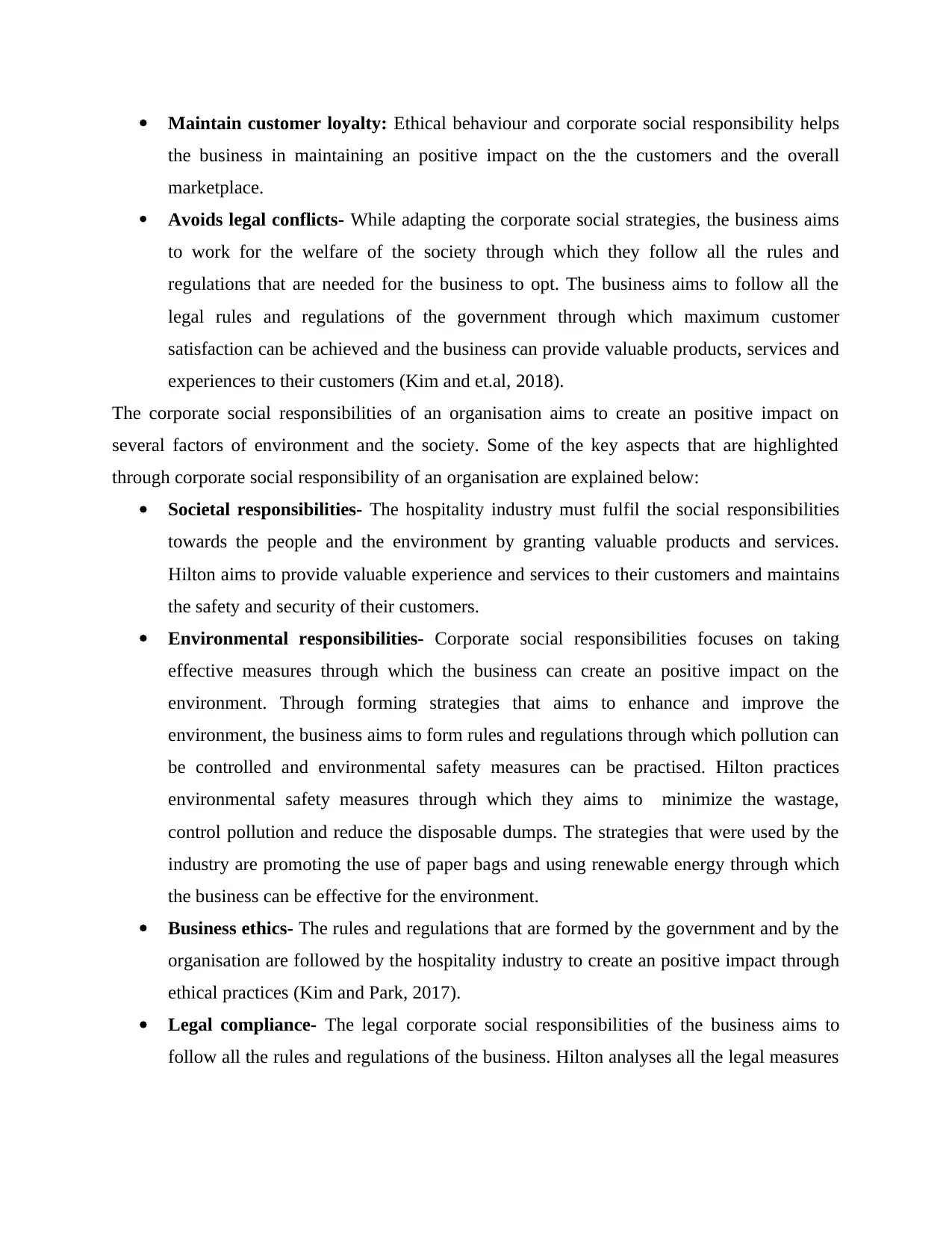
Maintain customer loyalty: Ethical behaviour and corporate social responsibility helps
the business in maintaining an positive impact on the the customers and the overall
marketplace.
Avoids legal conflicts- While adapting the corporate social strategies, the business aims
to work for the welfare of the society through which they follow all the rules and
regulations that are needed for the business to opt. The business aims to follow all the
legal rules and regulations of the government through which maximum customer
satisfaction can be achieved and the business can provide valuable products, services and
experiences to their customers (Kim and et.al, 2018).
The corporate social responsibilities of an organisation aims to create an positive impact on
several factors of environment and the society. Some of the key aspects that are highlighted
through corporate social responsibility of an organisation are explained below:
Societal responsibilities- The hospitality industry must fulfil the social responsibilities
towards the people and the environment by granting valuable products and services.
Hilton aims to provide valuable experience and services to their customers and maintains
the safety and security of their customers.
Environmental responsibilities- Corporate social responsibilities focuses on taking
effective measures through which the business can create an positive impact on the
environment. Through forming strategies that aims to enhance and improve the
environment, the business aims to form rules and regulations through which pollution can
be controlled and environmental safety measures can be practised. Hilton practices
environmental safety measures through which they aims to minimize the wastage,
control pollution and reduce the disposable dumps. The strategies that were used by the
industry are promoting the use of paper bags and using renewable energy through which
the business can be effective for the environment.
Business ethics- The rules and regulations that are formed by the government and by the
organisation are followed by the hospitality industry to create an positive impact through
ethical practices (Kim and Park, 2017).
Legal compliance- The legal corporate social responsibilities of the business aims to
follow all the rules and regulations of the business. Hilton analyses all the legal measures
the business in maintaining an positive impact on the the customers and the overall
marketplace.
Avoids legal conflicts- While adapting the corporate social strategies, the business aims
to work for the welfare of the society through which they follow all the rules and
regulations that are needed for the business to opt. The business aims to follow all the
legal rules and regulations of the government through which maximum customer
satisfaction can be achieved and the business can provide valuable products, services and
experiences to their customers (Kim and et.al, 2018).
The corporate social responsibilities of an organisation aims to create an positive impact on
several factors of environment and the society. Some of the key aspects that are highlighted
through corporate social responsibility of an organisation are explained below:
Societal responsibilities- The hospitality industry must fulfil the social responsibilities
towards the people and the environment by granting valuable products and services.
Hilton aims to provide valuable experience and services to their customers and maintains
the safety and security of their customers.
Environmental responsibilities- Corporate social responsibilities focuses on taking
effective measures through which the business can create an positive impact on the
environment. Through forming strategies that aims to enhance and improve the
environment, the business aims to form rules and regulations through which pollution can
be controlled and environmental safety measures can be practised. Hilton practices
environmental safety measures through which they aims to minimize the wastage,
control pollution and reduce the disposable dumps. The strategies that were used by the
industry are promoting the use of paper bags and using renewable energy through which
the business can be effective for the environment.
Business ethics- The rules and regulations that are formed by the government and by the
organisation are followed by the hospitality industry to create an positive impact through
ethical practices (Kim and Park, 2017).
Legal compliance- The legal corporate social responsibilities of the business aims to
follow all the rules and regulations of the business. Hilton analyses all the legal measures
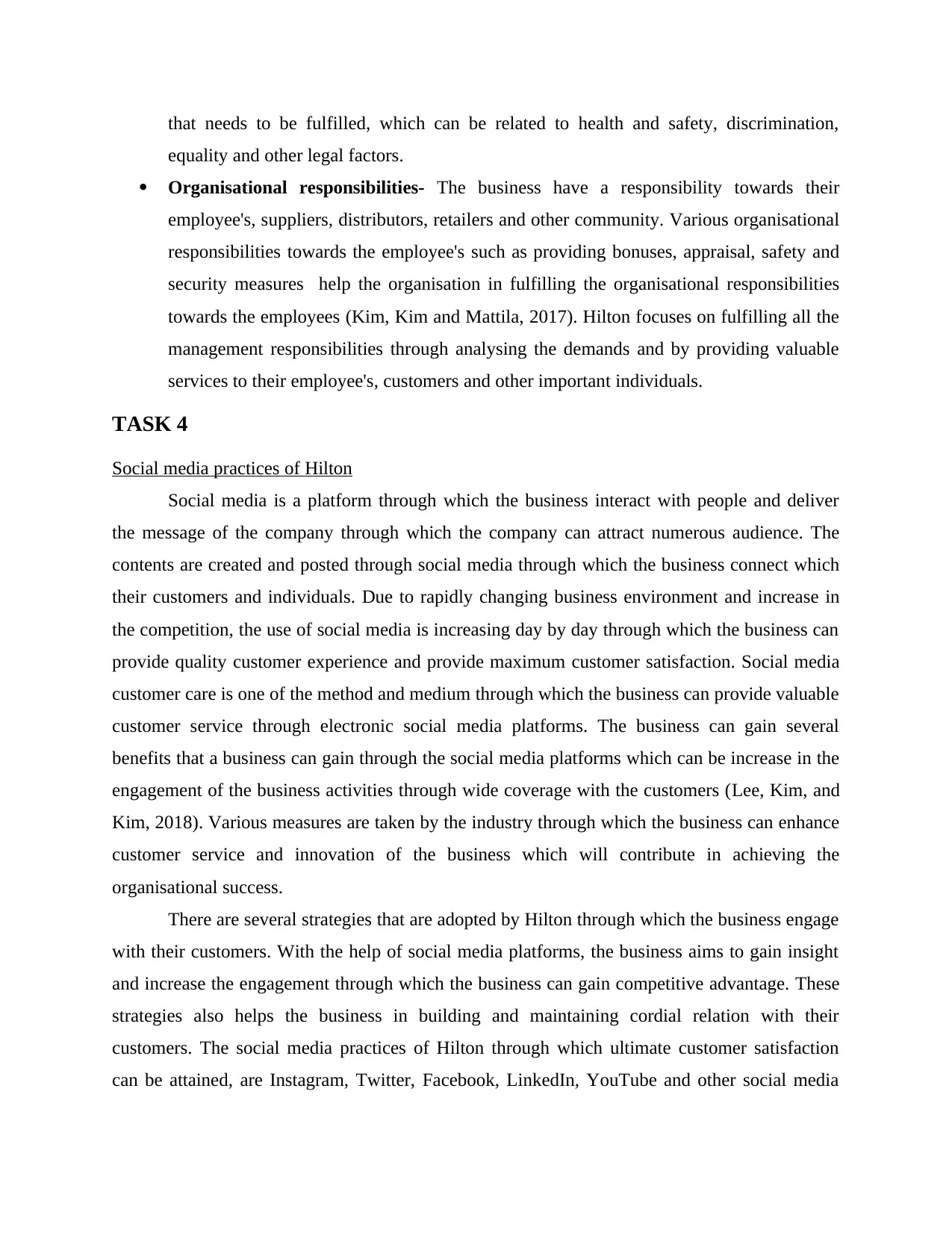
that needs to be fulfilled, which can be related to health and safety, discrimination,
equality and other legal factors.
Organisational responsibilities- The business have a responsibility towards their
employee's, suppliers, distributors, retailers and other community. Various organisational
responsibilities towards the employee's such as providing bonuses, appraisal, safety and
security measures help the organisation in fulfilling the organisational responsibilities
towards the employees (Kim, Kim and Mattila, 2017). Hilton focuses on fulfilling all the
management responsibilities through analysing the demands and by providing valuable
services to their employee's, customers and other important individuals.
TASK 4
Social media practices of Hilton
Social media is a platform through which the business interact with people and deliver
the message of the company through which the company can attract numerous audience. The
contents are created and posted through social media through which the business connect which
their customers and individuals. Due to rapidly changing business environment and increase in
the competition, the use of social media is increasing day by day through which the business can
provide quality customer experience and provide maximum customer satisfaction. Social media
customer care is one of the method and medium through which the business can provide valuable
customer service through electronic social media platforms. The business can gain several
benefits that a business can gain through the social media platforms which can be increase in the
engagement of the business activities through wide coverage with the customers (Lee, Kim, and
Kim, 2018). Various measures are taken by the industry through which the business can enhance
customer service and innovation of the business which will contribute in achieving the
organisational success.
There are several strategies that are adopted by Hilton through which the business engage
with their customers. With the help of social media platforms, the business aims to gain insight
and increase the engagement through which the business can gain competitive advantage. These
strategies also helps the business in building and maintaining cordial relation with their
customers. The social media practices of Hilton through which ultimate customer satisfaction
can be attained, are Instagram, Twitter, Facebook, LinkedIn, YouTube and other social media
equality and other legal factors.
Organisational responsibilities- The business have a responsibility towards their
employee's, suppliers, distributors, retailers and other community. Various organisational
responsibilities towards the employee's such as providing bonuses, appraisal, safety and
security measures help the organisation in fulfilling the organisational responsibilities
towards the employees (Kim, Kim and Mattila, 2017). Hilton focuses on fulfilling all the
management responsibilities through analysing the demands and by providing valuable
services to their employee's, customers and other important individuals.
TASK 4
Social media practices of Hilton
Social media is a platform through which the business interact with people and deliver
the message of the company through which the company can attract numerous audience. The
contents are created and posted through social media through which the business connect which
their customers and individuals. Due to rapidly changing business environment and increase in
the competition, the use of social media is increasing day by day through which the business can
provide quality customer experience and provide maximum customer satisfaction. Social media
customer care is one of the method and medium through which the business can provide valuable
customer service through electronic social media platforms. The business can gain several
benefits that a business can gain through the social media platforms which can be increase in the
engagement of the business activities through wide coverage with the customers (Lee, Kim, and
Kim, 2018). Various measures are taken by the industry through which the business can enhance
customer service and innovation of the business which will contribute in achieving the
organisational success.
There are several strategies that are adopted by Hilton through which the business engage
with their customers. With the help of social media platforms, the business aims to gain insight
and increase the engagement through which the business can gain competitive advantage. These
strategies also helps the business in building and maintaining cordial relation with their
customers. The social media practices of Hilton through which ultimate customer satisfaction
can be attained, are Instagram, Twitter, Facebook, LinkedIn, YouTube and other social media
⊘ This is a preview!⊘
Do you want full access?
Subscribe today to unlock all pages.

Trusted by 1+ million students worldwide
1 out of 18
Related Documents
Your All-in-One AI-Powered Toolkit for Academic Success.
+13062052269
info@desklib.com
Available 24*7 on WhatsApp / Email
![[object Object]](/_next/static/media/star-bottom.7253800d.svg)
Unlock your academic potential
Copyright © 2020–2026 A2Z Services. All Rights Reserved. Developed and managed by ZUCOL.





